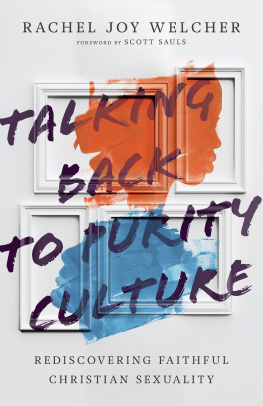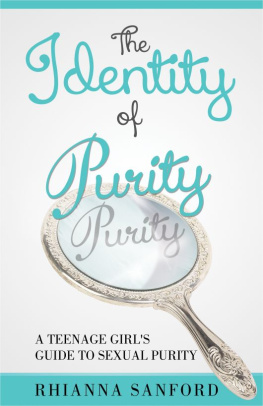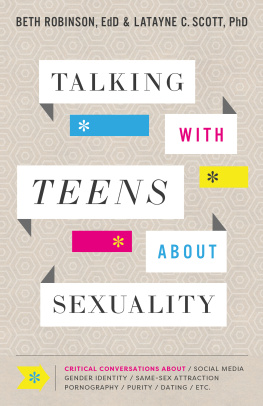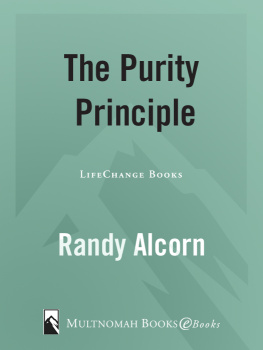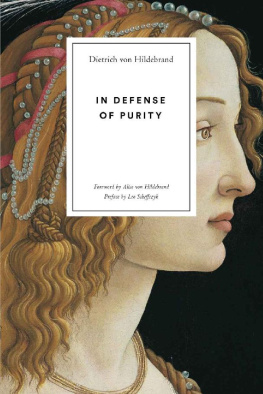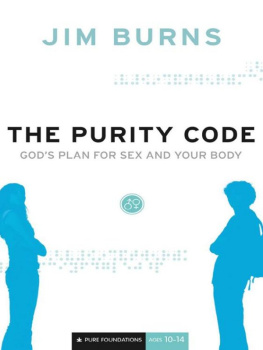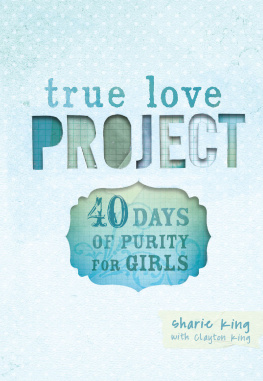Sommaire
Pagination de l'dition papier
Guide
Talking
Back
to Purity
Culture
Rediscovering Faithful
Christian Sexuality
Rachel Joy Welcher
foreword by scott sauls
InterVarsity Press
P.O. Box 1400, Downers Grove, IL 60515-1426
ivpress.com
2020 by Rachel Joy Welcher
All rights reserved. No part of this book may be reproduced in any form without written
permission from InterVarsity Press.
InterVarsity Pressis the book-publishing division of InterVarsity Christian Fellowship/USA, a movement of students and faculty active on campus at hundreds of universities, colleges, and schools of nursing in the United States of America, and a member movement of the International Fellowship of Evangelical Students. For information about local and regional activities, visit intervarsity.org.
All Scripture quotations, unless otherwise indicated, are taken from The Holy Bible, New International Version, NIV. Copyright 1973, 1978, 1984, 2011 by Biblica, Inc.Used by permission of Zondervan. All rights reserved worldwide. www.zondervan.com. The NIV
and New International Version are trademarks registered in the United States Patent and Trademark Office by Biblica, Inc.
While any stories in this book are true, some names and identifying information may have been changed to protect the privacy of individuals.
Cover design and image composite: David Fassett
Images: white photoframes montage: AlexeyVS / iStock / Getty Images Plus
The publisher cant verify the accuracy of website hyperlinks beyond the date of print publication
ISBN 978-0-8308-4817-1 (digital)
ISBN 978-0-8308-4816-4 (print)
This digital document has been produced by Nord Compo.
To the hurting, the abused, and the angry; the weary,
the curious, and the skeptical. To those whose faith is
smaller than a mustard seed, and to those who, after
experiencing the rough and tumble of life, still cling to
the hem of Jesus robe: you will not be put to shame.
Foreword
Scott Sauls
I t has been said that in and following the New Testament era, Christians were widely known for being promiscuous with their money and conservative with their bodies.
Their so-called financial promiscuity was directed toward the work of God and the needs of the poor, while their bodily conservatism reflected their belief in a vision for sex and marriage passed on to them by Moses, the prophets and apostles, and Jesus himself. This vision affirms the sometimes-scandalous belief that sexual intercoursea glorious gift from God given chiefly for human intimacy, pleasure, and procreationis reserved uniquely for marriage between one man and one woman.
According to many in our late modern times, such a limiting view of sex and marriage seems preposterous. According to one Harvard student in her impassioned defense of college hookup culture, For me, being a strong woman means not being ashamed that I like to have sex.... To say that I have to care about every person I have sex with is an unreasonable expectation. It feels good! It feels good!
It may come as a surprise to some that ancient cultures were just as appalled by Christian sexuality as their twenty-first-century counterparts are. The sexual revolution is no recent phenomenon but is as old as time itself. Then as now, in most instances, the men fared better than the women.
From the earliest pages of Scripture, even highly esteemed patriarchs would pleasure themselves with prostitutes, accumulate multiple wives and concubines, and spill their seed on the ground in an act of loveless passion. Abraham, the father of all who have faith, offered his wife up to sexual predators in an effort to save his own skin. King David abused his power when he saw and then took Bathsheba, his next-door neighbor and wife of one of his closest, most loyal friends. Lacking in all subtlety, the disciple Matthew records that David was the father of Solomon, whose mother had been Uriahs wife (Matthew 1:6). In New Testament Corinth, a man in the church had sexual relations with his stepmother. And adultery was defined by Jesus as not only the physical act but also lustful fantasy.
Thats just a sampling from among those who did believe in God. And then there were the Romans, a brutish and godless power culture that also lived by the double standard. It was the rule, not the exception, for prominent men of Rome to be sexually involved with multiple mistresses as well as a younger man or two in addition to their wives. Women, on the other hand, were not allowed such freedoms. Likewise, if a woman gave birth to a girl, the husband would decide whether they should keep the child or throw her awayakin to a postpartum abortion as it were.
In our twenty-first-century context, we would like to think of ourselves as more enlightened, as if we have somehow progressed beyond such ugly human realities. But have we? The emergence of and growing popularity of pornography, nonmarried cohabitation, LGBTQ+ concerns and culture, polyamorous arrangements, and hookup culture attest otherwise.
Whats more, the #MeToo movement has arisen and emboldened women and their allies to (finally) say, No more! to predatory and perverted men. Many well-known celebrities and influencers have lent their names and platforms to advance the #MeToo cause. At the same time, many of these same celebrities and influencers have also, on those very same platforms, lauded and eulogized the late Hugh Hefner, the famed sex mogul who championed a climate in which the use, abuse, objectification, and subjugation of women could flourish as a civil rights hero.
As it was in ancient times, so it is today. Ours is a culture of sexual confusion, oppression, and slavery that masks itself as a culture of sexual freedom.
In reaction to a hypersexualized world, the Christian purity culture was born. While well-intended in some respects, the purity movement would, not unlike its sexual revolution counterpart, overswing the pendulum and become its own version of a culture of shame. Not only would unmarried people be told to avoid sex but also all forms of kissing, holding hands, and dating. Men and boys were rightly encouraged to do battle against lust and flee from sexual immorality. To help the men succeed, women and girls were wrongly blamed for making men stumble by dressing immodestly (whatever that means). Likewise, married women were admonished for not putting out enough in the marriage beds, thus causing their (often emotionally unavailable) husbands eyes to wander.
In the sexual revolution climate, what is needed is not less sexual freedom but better and healthier sexual freedom. Those who are unmarried (like the apostle Paul and Jesus Christ) are free to embrace countercultural chastity as a high, holy, and praiseworthy calling. In doing so, these men and women affirm Gods unique design for sex and in so doing protect their own souls from injury. Sex works a lot like fire. When removed from its protective boundaries, it burns us and leaves scars. When brought and kept inside those covenanted boundaries, a sweet foretaste of the ultimate love feast between Christ and his Bride, the Church, is given.
But the picture God paints of healthy, life-giving sexuality is also different than the one from the old TV show Leave It to Beaver in which Ward and June shared a bedroom but slept in separate beds. Instead, the Maker of sex and marriage tells husbands to rejoice in the wife of your youth and may her breasts satisfy you always, may you ever be intoxicated with her love (Proverbs 5:18-19). He tells Adam and Eve, the first married couple, to fully consummate their naked-and-without-shame state by coming together as one flesh (Genesis 2:24). He brings us into the bedroom of the she and the he of the Song of Songs, where husband and wife recite erotic poetry and sing erotic love songs over one anothers naked bodies. Centuries later, Paul, the unmarried apostle, commands able-bodied husbands and wives to enjoy sexual intercourse often, except in temporary Lenten-like seasons of prayer and fasting because his body belongs to her and her body belongs to him (1 Corinthians 7:4).

